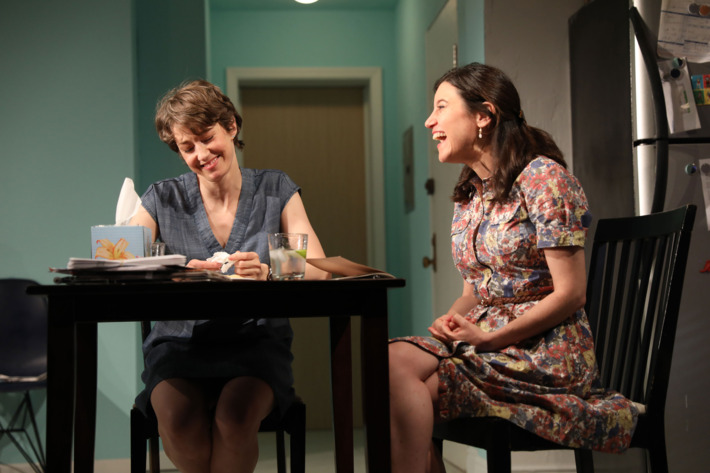

I shouldn’t be surprised that an offering at New York Theatre Workshop would be an exceptional piece of theater, but Amy Herzog’s Mary Jane directed by Anne Kauffman, transcends even the highest of my expectations.
Before I begin, I should admit that I jumped at the chance to review Mary Jane, when I heard Carrie Coon would embody the eponymous role. As a disciple of The Leftovers, I couldn’t wait to see the talented actress onstage and in Mary Jane she is nothing short of staggering as a single mother navigating the realities of caring for her chronically ill child. Part of what is so impressive about Coon’s performance is her ability to embody the performance of motherhood in a time of crisis. And by performance, I don’t mean posting updates on Facebook or other outwardly public displays of ‘motherness,’ but by the ways a mother displays she has it together and affects normalcy when the situation is anything but. Mary Jane wants people to know that she is okay, that she is grounded, that she is decidedly “fine,” and that she can see an outcome that isn’t dismal for her child’s and her own situation. There is so much pain and uncertainty being hidden away, covered by cheerfulness and optimism. Mary Jane tries to maintain herself, but it all eventually becomes too overwhelming, and the facade splinters, revealing her distress. This inner struggle is palpable and expertly conveyed by Coon. The source of this pain, her child, Alex, is all but hidden from view, either tucked away in the offstage bedroom or enveloped in a shroud of blankets, elevated on a hospital bed, but is nevertheless a constant presence, a gravitational pull of heartache and devotion that cannot be ignored.
At various points, Mary Jane asks if there is a meaning to the suffering of herself and her child, a reason why all of this is happening. Is this punishment? Would religion make this easier? Herzog, however, doesn’t promote the situation as some retribution for past deeds or some sadistic spiritual test. If anything, the connections between the characters, their conversations and offerings to each other are all the more meaningful because resolution is not what is sought after. There is no answer or source of meaning, only the sanctity of intimate connection. What happens or what will happen is arbitrary. Mary Jane interacts with actresses who play dual roles throughout the performance, Liza Colón-Zayas (Sherry/Dr. Toros), Danaya Esperanza (Amelia/Kat), Susan Pourfar (Brianne/Chaya), and Brenda Wehle (Ruthie/Tenkei). They embody different sides of the same coin in the people they play: spiritual guidance, caretaking, comfort, and solidarity. All of their performances are worthy of note.
Mary Jane is an exploration of an impossible situation: being the single mother to a sick child, loving someone deeply who suffers constantly, giving life but not being able to fix it. It should not be missed.